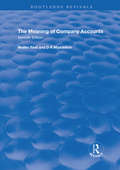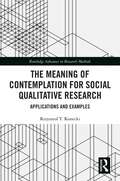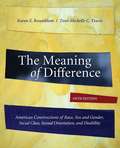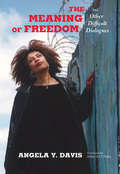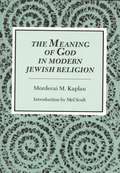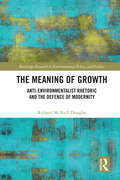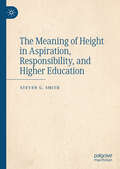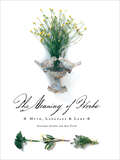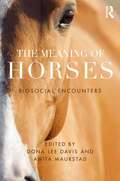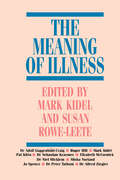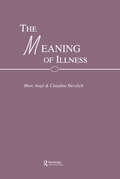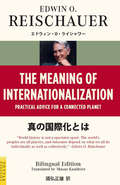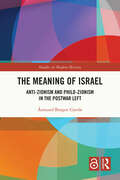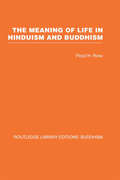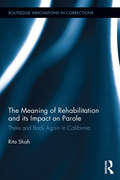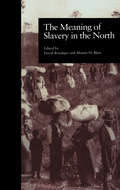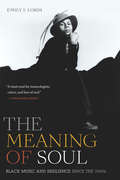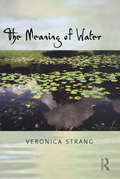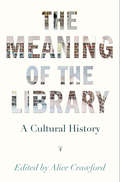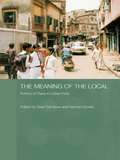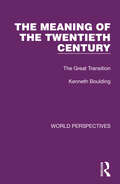- Table View
- List View
The Meaning of Company Accounts (Routledge Revivals)
by Walter ReidThis title was first published in 2000: The authors' workbook approach provides a treatment of financial accounting practice which readers at differing levels of knowledge can tailor individually to their learning requirements. There is an appendix of photocopiable formats including financial rations and segment analysis.
The Meaning of Contemplation for Social Qualitative Research: Applications and Examples (Routledge Advances in Research Methods)
by Krzysztof T. KoneckiThis book offers an account of contemplative reflection in qualitative social research. Focusing on the experiences of the researcher – including sensory and emotional experiences – and the work of the mind in the investigative process, it considers the means by which the researcher’s basic assumptions can be analysed and bracketed, so as to shed light on the process by which knowledge is produced. Through an exploration of the methods of meditation, auto-observation and self-reports, epoché, ‘contemplative memo-ing’, and the contemplative diary, the author explores the essential role of subjectivity in qualitative research, providing inspiration for more mindful research. As such, it will appeal to scholars of sociology, anthropology and geography with interests in phenomenology, research methods and the role of the mind in the research process.
The Meaning of Difference: American Constructions of Race, Sex and Gender, Social Class, Sexual Orientation, and Disability (5th Edition)
by Karen E. Rosenblum Toni-Michelle C. TravisThe Meaning of Difference focuses on the social construction of difference as it operates in American formulations of race and ethnicity, sex and gender, social class, sexual orientation, and disability. The conceptual structure of this text-reader comes from four framework essays addressing the construction of difference, the experience of difference, the social meaning of difference, and social action that might bridge differences. Each framework essay is followed by a set of readings selected for readability, conceptual depth, and applicability to a variety of statuses. Boxed inserts throughout offer first-person accounts from real people, many of them students. This edition features an expanded focus on disability and 29 new readings, including articles on how immigration is transforming the nature of American race and ethnic categories, the changing shape of higher education, and the experience of Americans of Middle-Eastern descent.
The Meaning of Flowers: Myth, Language & Lore
by Ann Field Gretchen ScobleA colorful primer to the symbolism and lore from around the world for over sixty flowers to help you add meaning to any floral gift.Should you send a rose of crimson or of white to the one you love? What gift of flowers best expresses thanks to a dear friend? From ancient days, long before words complicated what we say to one another, flowers have been our messengers, invested with our most cherished feelings.Illustrated with luscious collages by acclaimed artist Ann Field, this enchanting tribute to the power and symbolism of flowers offers a contemporary introduction to an age-old tradition. The text draws on botanical, historical, and mythological sources worldwide, from ancient Rome to Victorian England, from Asia to the Americas, presenting portraits of over sixty blossoms favored for all time. In Persia, for instance, the black medulla of the red tulip was said to represent the lover’s heart, burnt to a coal by love’s passion. To Victorians, lavender signified a broken trust, hollyhocks fertility, and nasturtiums a jest or whimsy.Blending fact, folktale, natural history, and original art, The Meaning of Flowers explores the language and lore of nature’s most intimate and beautiful gifts.
The Meaning of Freedom
by Angela Y. Davis Robin D.G. Kelley"Davis' arguments for justice are formidable. . . . The power of her historical insights and the sweetness of her dream cannot be denied."-The New York TimesWhat is the meaning of freedom? Angela Y. Davis' life and work have been dedicated to examining this fundamental question and to ending all forms of oppression that deny people their political, cultural, and sexual freedom. In this collection of twelve searing, previously unpublished speeches, Davis confronts the interconnected issues of power, race, gender, class, incarceration, conservatism, and the ongoing need for social change in the United States. With her characteristic brilliance, historical insight, and penetrating analysis, Davis addresses examples of institutional injustice and explores the radical notion of freedom as a collective striving for real democracy-not a thing granted by the state, law, proclamation, or policy, but a participatory social process, rooted in difficult dialogues, that demands new ways of thinking and being. "It is not too much," writes Robin D.G. Kelly in the introduction, "to call her one of the world's leading philosophers of freedom." The Meaning of Freedom articulates a bold vision of the society we need to build and the path to get there. This is her only book of speeches and her first full-length book since Are Prisons Obsolete? (2003).Angela Y. Davis is professor emerita at the University of California and author of eight books. She is a much sought after public speaker and an internationally known advocate for social justice.Robin D.G. Kelley is the author of many books and a professor at the University of Southern California.
The Meaning of God in Modern Jewish Religion
by Mel Scult Mordecai M. KaplanIn this book, Kaplan enlarges on his notion of functional reinterpretation and then actually applies it to the entire ritual cycle of the Jewish year-a rarity in modern Jewish thought. This work continues to function as a central text for the Reconstructionist movement, whose influence continues to grow in American Jewry.
The Meaning of Growth: Anti-Environmentalist Rhetoric and the Defence of Modernity (Routledge Research in Environmental Policy and Politics)
by Richard McNeill DouglasSince the Limits to Growth report was published in 1972 it has been widely known that a commitment to endless growth was putting us on course for environmental disaster—so why have we failed to take decisive political action in the half-century since then? In The Meaning of Growth, Richard McNeill Douglas uses interpretive social science to uncover the cultural roots of political resistance to environmental science and policy.Through a close reading of anti-environmentalist rhetoric the book identifies its idolisation of growth as a defence of a modern (Western-European) world-view, focusing on values of freedom, power, and immortality. The significance of these findings is drawn out by applying the ‘secularisation thesis’, a theoretical account of the development of a modern understanding of reality from a theological world-view to which it is ostensibly opposed. This framework is used to offer a deep interpretation of what is at stake in environmental debate: that to accept there are limits to growth means abandoning crucial elements of a faith in a theodicy of progress that makes life meaningful in a secular age. Douglas concludes by suggesting that the precondition for political action on the environment is a change of philosophical perspective that provides for a sense of meaning in a world of limits.This book should be of interest to academics in the fields of environmental sociology and communications studies, as well as activists interested in understanding the motivations of anti-environmentalist campaigners and how to counter their influence.
The Meaning of Height in Aspiration, Responsibility, and Higher Education
by Steven G. SmithThe Meaning of Height takes seriously the traditional figure of “higher life” for intrinsically preferable manners of living. Reworking the Platonic model of ascent to the ideal and descent to responsible engagement with the world, The Meaning of Height lays out concrete possible itineraries of reaching (upward to new acquisitions of personal capacity) and righting (downward from prompts for good order), showing connections between individual and social fulfillment. By focusing on our diversely demanding encounters with the interesting, the important, and the transcendent, the book strikes a counterpoint to the commonly homogenized conception of personal “happiness.” It also counters illiberal views of higher education with a Humboldtian vitality argument for a meaningfully “high” higher education geared to full development of human faculties, a level of education to which the disciplines of philosophy and religious studies make essential contributions. The book concludes by considering the essential role of this sort of higher education in democratic societies.
The Meaning of Herbs: Myth, Language & Lore
by Ann Field Gretchen ScobleThe fascinating history and uses of these versatile botanicals through the ages, from love potions to self-care—from the authors of The Meaning of Flowers. &“Take borage for courage. Send a bouquet of yarrow to declare war. Hang a sprig of rue at the door to keep witches at bay.&” Like flowers, herbs are steeped in myth and magic, secrets and lore. For centuries, their powers have been called upon to seduce lovers and dispel witches, send hidden messages and brew potent elixirs, entice the palate and soothe the mind. Illustrated with enchanting collages by acclaimed artist Ann Field, this delightful tribute to the meaning and magic of herbs offers a contemporary introduction to an age-old tradition. The text draws on botanical, mythological, and historical sources worldwide, from ancient Rome to Victorian England, from Asia to the Americas, presenting profiles of over fifty herbs favored through the ages. Blending fact, folktale, natural history, and original art, The Meaning of Herbs explores the language and lore of nature&’s most versatile and powerful gifts.
The Meaning of Horses: Biosocial Encounters
by Dona Davis Anita MaurstadThe Meaning of Horses: Biosocial Encounters examines some of the engagements or entanglements that link the lived experiences of human and non-human animals. The contributors discuss horse-human relationships in multiple contexts, times and places, highlighting variations in the meaning of horses as well as universals of ‘horsiness’. They consider how horses are unlike other animals, and cover topics such as commodification, identity, communication and performance. <P><P>This collection emphasises the agency of the horse and a need to move beyond anthropocentric studies, with a theoretical approach that features naturecultures, co-being and biosocial encounters as interactive forms of becoming. Rooted in anthropology and multispecies ethnography, this book introduces new questions and areas for consideration in the field of animals and society.
The Meaning of Illness
by Marc Auge Claudine HerzlichFirst Published in 1988. Routledge is an imprint of Taylor & Francis, an informa company.
The Meaning of Illness
by Marc Augé Claudine HerzlichThis book is based on collective research carried out during the 1980s. This edition appears ten years after the original publication in French. Since then we have experienced many changes. In the late decade, disciplines have changed, as have the societies being researched. The outbreak of AIDS in Africa and the industrial world is not the least of these major and influential changes. The reader today will be sensitive to these changes and this research maintains its value as an intellectual endeavour and a useful model.
The Meaning of Internationalization
by Edwin O. Reischauer Masao KunihiroIn The Meaning of Internationalization, Edwin O. Reischauer--former American Ambassador to Japan and one of the world's most acclaimed scholars of Japanese life and culture--delivers a heartfelt message to the Japanese people on the need to look beyond their borders at the changing nature of the world. Reischauer stresses the need to adapt in order to survive and thrive in the new reality that our ever-shrinking world is bringing about--a message that resonates even more deeply today and applies not just to Japan, but to every country in the new global economy.
The Meaning of Internationalization
by Edwin O. Reischauer Masao KunihiroIn The Meaning of Internationalization, Edwin O. Reischauer--former American Ambassador to Japan and one of the world's most acclaimed scholars of Japanese life and culture--delivers a heartfelt message to the Japanese people on the need to look beyond their borders at the changing nature of the world. Reischauer stresses the need to adapt in order to survive and thrive in the new reality that our ever-shrinking world is bringing about--a message that resonates even more deeply today and applies not just to Japan, but to every country in the new global economy.
The Meaning of Israel: Anti-Zionism and Philo-Zionism in the Postwar Left (Routledge Studies in Modern History)
by Åsmund Borgen GjerdeWhy did social democrats in the 1940s and 1950s idealise Zionism and Israel? And why did ‘the New Left’ of the 1960s denounce Israel as an apartheid state and a ‘bridgehead of imperialism’? The Meaning of Israel: Anti-Zionism and Philo-Zionism in the Postwar Left, a case study of Norway, offers new and intriguing answers to both questions. Previous national case studies of left ideas about Israel have tended to explain with reference to national peculiarities of the country in question (e.g. guilt over the Holocaust in the case of Germany). This book, by contrast, considers its findings about Norway in the context of what we know from other national case studies and uses this approach to suggest explanations that may be valid across national boundaries.The Meaning of Israel argues that left ideas about Zionism and Israel have been inextricably intertwined with ideas about civilisation. Post-war social democrats used ideas about Zionism and Israel to assuage their anxiety about the future of civilisation and to reaffirm the viability of this very concept. The anti-Zionism of the New Left, on the other hand, grew out of a broader rejection of ideas of civilisation. The book will appeal to academics and general readers interested in the history of the Left, Israel, and anti-semitism.
The Meaning of Life in Hinduism and Buddhism (Routledge Library Editions: Buddhism)
by Floyd H RossOriginally published in 1952. This volume, by discussing significant insights of Hinduism and Buddhism, answers the question "What is the meaning of life?" It illustrates the importance of Buddhist and Hindu teachings and their relevance to the West, as well as clarifying some of the religious and philosophical problems Western readers must grapple with.
The Meaning of Rehabilitation and its Impact on Parole: There and Back Again in California (Innovations in Corrections)
by Rita ShahThis book queries the concept of rehabilitation to determine how, on a legislative and policy level, the term is defined as a goal of correctional systems. The book explores what rehabilitation is by investigating how, at different moments in time, its conceptualization has shaped, and been shaped by, shifting norms, practices, and institutions of corrections in California. The author calls for a rethinking of theoretical understandings of the corrections system, generally, and parole system, specifically, and calls for an expansion in the questions asked in reintegration studies. The book is designed for scholars seeking to better understand the relationship between correctional systems and rehabilitation and the full scope of rehabilitation as a legislative goal, and is also suitable for use as teaching tool for historical, textual, and interviewing methods.
The Meaning of Slavery in the North (Labor in America #Vol. 4)
by David Roediger Martin H. BlattSouthern cotton planters and Northern textile mill owners maintained what has been called "an unholy alliance between the lords of the lash and the lords of the loom." This collection of essays focuses on the central role of slavery in the early development of industrialization in the United States as well as on the interconnections among the histories of African Americans, women, and labor.
The Meaning of Soul: Black Music and Resilience since the 1960s (Refiguring American Music)
by Emily J. LordiIn The Meaning of Soul, Emily J. Lordi proposes a new understanding of this famously elusive concept. In the 1960s, Lordi argues, soul came to signify a cultural belief in black resilience, which was enacted through musical practices—inventive cover versions, falsetto vocals, ad-libs, and false endings. Through these soul techniques, artists such as Aretha Franklin, Donny Hathaway, Nina Simone, Marvin Gaye, Isaac Hayes, and Minnie Riperton performed virtuosic survivorship and thus helped to galvanize black communities in an era of peril and promise. Their soul legacies were later reanimated by such stars as Prince, Solange Knowles, and Flying Lotus. Breaking with prior understandings of soul as a vague masculinist political formation tethered to the Black Power movement, Lordi offers a vision of soul that foregrounds the intricacies of musical craft, the complex personal and social meanings of the music, the dynamic movement of soul across time, and the leading role played by black women in this musical-intellectual tradition.
The Meaning of Video Games: Gaming and Textual Strategies
by Steven E. JonesThe Meaning of Video Games takes a textual studies approach to an increasingly important form of expression in today’s culture. It begins by assuming that video games are meaningful–not just as sociological or economic or cultural evidence, but in their own right, as cultural expressions worthy of scholarly attention. In this way, this book makes a contribution to the study of video games, but it also aims to enrich textual studies. Early video game studies scholars were quick to point out that a game should never be reduced to merely its "story" or narrative content and they rightly insist on the importance of studying games as games. But here Steven E. Jones demonstrates that textual studies–which grows historically out of ancient questions of textual recension, multiple versions, production, reproduction, and reception–can fruitfully be applied to the study of video games. Citing specific examples such as Myst and Lost, Katamari Damacy, Halo, Façade, Nintendo’s Wii, and Will Wright’s Spore, the book explores the ways in which textual studies concepts–authorial intention, textual variability and performance, the paratext, publishing history and the social text–can shed light on video games as more than formal systems. It treats video games as cultural forms of expression that are received as they are played, out in the world, where their meanings get made.
The Meaning of Water
by Veronica StrangWater is the most valuable resource and the most passionately contested. Drought has become an increasingly extreme problem in many parts of the world, and it is predicted that 60% of the major cities in Europe will run short of water in the next decade. In industrialized countries per capita water usage continues to rise intractably, despite strenuous efforts by environmentalists and resource managers to encourage conservation. Conflicts over water and environmental degradation from the overuse of resources are intensifying. Water is not merely a physical resource: in every cultural context it is densely encoded with social, spiritual, political and environmental meanings, and these have a powerful effect upon patterns of water use and upon the relationships between water users and suppliers. This book makes an in-depth analysis of the meanings of water and considers how they are experienced and formed at an individual and societal level. Focusing on the River Stour in Dorset, Strang draws upon a wide range of data: ethnographic research, cultural mapping, local archives and folklore. She explores the controversies surrounding water ownership and management, and the social and political questions raised by water privatization in the UK. The topical nature of these issues and their global relevance make this book a vital contribution to contemporary research on water and an essential read for anyone with an interest in getting under the surface of one of the worlds most important social and environmental issues.
The Meaning of Wife: A Provocative Look at Women and Marriage in the Twenty-First Century
by Anne Kingston"One part The Beauty Myth . . . and one part Backlash"*--a provocative exploration of who and what a wife really is.There is a wife crisis in North America, a brewing storm of conflicting forces swirling around what it means to be a wife at the beginning of the 21st Century. The word is so fraught with ambiguity that it has become a litmus test, eliciting from women emotions ranging from longing to antipathy, anxiety to derision. This crisis is at the heart of Anne Kingston's The Meaning of Wife.Delving into the complex, troubling, and sometimes humorous contradictions, illusions, and realities of contemporary wifehood, Kingston takes the reader on a fascinating journey into the wedding industrial complex, which elevates the bride to a potent consumer icon; through the recent romanticization of domesticity; and across the conflicted terrain of wifely sexuality. She looks at "wife backlash," and the new wave of neo-traditionalism that urges women to marry before their "best-before" dates expire; explores the apotheosis of abused wives and the strange celebration of wives who kill; and muses on the fact that Oprah Winfrey and Martha Stewart, two of the world's wealthiest and most influential women, are both non-wives whose success has hinged on thier understanding of wives. The result is an entertaining mix of social, sexual, historical, and economic commentary that is bound to stir debate even as it reframes our view of both women and marriage.
The Meaning of the Library: A Cultural History
by Alice CrawfordFrom Greek and Roman times to the digital era, the library has remained central to knowledge, scholarship, and the imagination. The Meaning of the Library is a generously illustrated examination of this key institution of Western culture. Tracing what the library has meant since its beginning, examining how its significance has shifted, and pondering its importance in the twenty-first century, notable contributors—including the Librarian of Congress and the former executive director of the HathiTrust—present a cultural history of the library. In an informative introduction, Alice Crawford sets out the book's purpose and scope, and an international array of scholars, librarians, writers, and critics offer vivid perspectives about the library through their chosen fields. The Meaning of the Library will appeal to all who are interested in this vital institution's heritage and ongoing legacy.
The Meaning of the Local: Politics of Place in Urban India
by Geert De Neve Henrike DonnerBy zooming in on urban localities in India and by unpacking the 'meaning of the local' for those who live in them, the ten papers in this volume redress a recurrent asymmetry in contemporary debates about globalisation. In much literature, the global is associated with transnationalism, dynamism and activity, and the local with static identities and history. Focusing on a range of locales in India's metropolitan areas and provincial small towns, the contributions move beyond the assertion that space is socially constructed to explore the ways in which social and political relations are themselves spatially and historically contingent. Using detailed ethnography, the authors highlight the vitality of place-making in the lives of urban dwellers and the centrality of a 'politics of place' in the production of power, difference and inequality. The volume illustrates how urban spaces are increasingly interconnected through wider social and spatial processes, while local boundaries and group-based identities are at the same time reconstructed, and often even consolidated, through the use of 'traditional' idioms and localised practices. All contributions relate detailed case studies of everyday activities to a range of contemporary debates that highlight various spatial aspects of cultural identities, economic restructuring and political processes in India. The volume provides an interdisciplinary perspective on urban life in rapidly changing political and economic environments. It offers a contribution to policy-orientated debates on urban livelihoods and urban planning as well as a wealth of ethnographic material for those interested in the spatial dimensions of urban life in India.
The Meaning of the Twentieth Century: The Great Transition (World Perspectives #2)
by Kenneth BouldingOriginally published in 1965 and written by a noted economist and leader in the field of conflict resolution, this book traces the forces which have brought the 20th century ‘post-civilisation’ into being: the ever-increasing power of science and the scientific attitude, the global communication network, the high efficiency of industrial societies. New conditions pointed to a life of ease but also enormous problems. The book discusses how though our technical resources have become immense, social and psychological conflicts remain. The author’s training in psychology and economics combines with a deep sense of history to create a book which is as relevant now as when it was first published.
